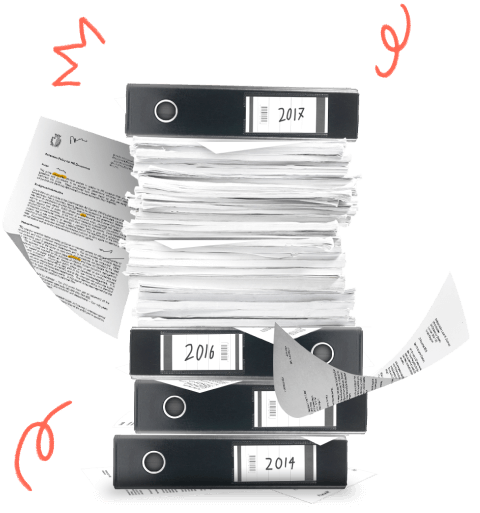
What is new with GST in 2021?
There are no new rules about GST in 2021. But certain services from foreign-based providers have become GST-charged from 2020.
We help Singapore businesses register for Goods and Services Tax, and we file it accurately on time




GST is a Goods and Services tax, or value-added tax. GST registration in Singapore is compulsory if your company’s turnover is over S$1 million a year.
The GST rate is 7%. The GST rate for the goods and services you sell to someone outside Singapore is 0%.
A voluntary GST registration is also an option and might bring you perks. From 2020, GST is applied not only to the goods and services rendered in Singapore but also to some of those coming and going from overseas.
Outsourcing bookkeeping and accounting can minimise the risk of missing the GST changes. It also helps you grasp the requirements and choose the most beneficial scenario for your particular type of business when dealing with GST.
GST amount (7%)
$0



You add 7% to the sum you charge the customer for your goods or services and then pay it to Inland Revenue Authority of Singapore (IRAS). For example, if your product costs S$50, you sell it for S$53,5, then you pay S$3,5 to the government.

You file GST once a quarter, no longer than 30 days after the reporting period ends. Even if your company has nothing o report, but it is GST-registred, you should file a ‘nil’ return.

When you buy goods or services, and you pay the sum with GST already included by the supplier.
However, you can refund GST when filing your tax return. Let’s say you buy products for S$100 (7% GST included, that is S$7). You use them and get a profit of S$1,000. You must pay S$70 as GST. You can claim the initial S$7 you paid (S$70 – S$7) and pay S$63 of GST to the government.
Singapore applies GST to most goods and services, except:





You don’t measure your business by the number of transactions, so neither do we. Our accounting packages are tied to your revenues. Pick a monthly plan to receive regular financials, or an end-of-the-year catch-up accounting to submit neat reports. All our packages come as they are, no extra charges — simple and straightforward.
What’s your average monthly ?
Additional services you may need
Get more89% of customers recommend us
7,500+ clients worldwide

GST registration is informing the Singapore government that your company will now pay Goods and Services Tax. Only companies that make S$1M in revenue a year or more have to pay GST. So once you’ve reached the mark, you need to let the Inland Revenue Authority in Singapore (IRAS) know.
To register, you need to fill in the GST F1 form and submit it to IRAS. You’ll have to prepare quite a lot of paperwork (see the detailed checklist on IRAS website). If you hire East river, we’ll take care of all the documents for you.
GST registration is mandatory if your company’s annual revenue has reached S$1M or is going to reach that mark soon. If your company makes less, the registration is up to you: there’s a process in place for voluntary GST registration. In some cases, voluntary registration makes more sense and can actually help you save on taxes.
As Singapore is a pro-business country, it takes abuse of the GST system seriously. Abuse here would mean whenever companies are unfairly overcharging customers or evading their tax responsibilities.
As a way of trying to encourage consumers and companies to be more vigilant regarding GST charges, IRAS grants up to 15% cash rewards to informants who report companies that have falsely charged GST or failed to pay GST. In the event of a violation, a company may be fined up to S$10,000 and pay a penalty equal to 10% of the tax due from the date the company has been required to register for GST. In other words, the company would be liable for all GST payments since the date it had to register for GST, even if no GST was collected from its customers.
All GST registered businesses are required to file GST F5 tax returns with IRAS.
The guidelines to filing GST returns are as follows:
In order to calculate a company's net GST, it must subtract its input GST from its output GST. Output tax is the GST that the company collected from its customers. Input tax is the GST that the company paid on purchases from suppliers or on imported goods.
The GST, or Goods and Services Tax, is a value-added tax on purchases. Only the final consumer of goods or services pays GST - purchases by other businesses are exempt from GST (they are charged GST, however, the charges are credited against the GST they charge). Singapore’s current GST rate is 7%.
The GST rate (7% in Singapore) is calculated by multiplying the pre-tax cost by the GST rate. The cost of GST is then added to the purchase.
Example: $100 of goods x 7% GST = $7 GST
$100 of goods + $7 GST = $107 total
You’ll have to register your company for GST when your company’s revenue and taxable income exceeds S$1M in revenue for the past 12 months. Even before your company hits this amount, you may want to voluntarily register for GST.
Here are some reasons why. You can voluntarily register your company for GST registration number. It makes your company look established. There is a psychological effect on clients and customers as they will think your company is of a certain size and generates a sizable revenue.
Another benefit of registering for GST is that you can claim the GST that you paid to your suppliers. When you are a GST-registered business, the GST you pay to other companies is called input tax. This tax can be claimed from IRAS.
It is compulsory for your company to register for GST if your total taxable turnover meets either of the following conditions:
According to the perspective view, more than $1 million is anticipated in the next 12 months. You must register for GST within 30 days of forecasting your taxable turnover to be more than $1 million in the next 12 months, and you will be registered on or before the 31st day following your forecasting date.
Taxable turnover includes local sales of goods and services, export sales, and provision of international services.
It is entirely possible for you to voluntarily register after carefully considering whether you are subject to GST registration.
The registration itself takes 10 working days from submitting the GST application form to getting the GST number. But preparing all the paperwork necessary to apply may take time. The list of required documents is extensive, and you even have to attach proof that you’ve completed an IRAS educational course on GST.
Keep in mind that once your company has it the S$1M annual revenue mark, you have 30 days to register for GST. We advise you to plan ahead and file for voluntary registration a bit earlier.
In Singapore you can check a company’s GST registration number online. Go to the Inland Revenue Authority in Singapore (IRAS) website and type in the company’s details. You can check one company using its name or up to 4 companies that you have UEN number, GST registration number, or NRIC.
